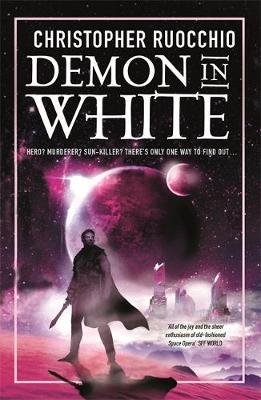Demon in White
Sun Eater, Book 3
Author: Christopher Ruocchio
Narrator: Saul Reichlin
Score: 5.0
Books like this: Masters & Mages, Revelation Space, Malazan
Length: 35hrs 59min
Published: 28/09/2020
Personal Score: 5.0 star
Professional Score: 5.0 star
TLDR: Our third outing into the Sun Eater universe is even better than the last. Enough action to keep the heart pumping and enough depth to keep your brain doing flips. A brilliant example of melding complex hard sci-fi within accessible, engaging prose.
I didn’t listen to Book 3 straight after Book 2, and I really wish I had. Does it detract from the enjoyment of this masterful piece of storytelling? No, but it would have helped in reminding me of all the twists and turns Hadrian and co have been dragged through thus far. You need to have read the prior books to really get to grips with the stunning level with which Ruocchio writes, but as long as you have, you’re going to be blown away by this book.
We once again re-join Hadrian decades after the events of the prior book, with our man now a knight in the emperor’s personal order and us having missed him beat the crap out of the Cielcin a few more times, and all the while his legend grows. People around the empire have heard about the whole half-mortal business now, and it’s starting to make waves. Unfriendly waves. Hadrian is still seeking some way to end the war, only now he’s plagued by visions of his potential futures as well as knowing that a peaceful resolution will never be an option. The Cielcin understand nothing but pain and power, and pain and power are things that Hadrian is no stranger to.
As ever, the language in the series is brilliant. I have noticed that Ruocchio appears to have toned it down some from the thesaurus-fiend he began as, but he’s nevertheless honed his prose to an edge finer than one of his mono-molecular swords. These books have always had depth. A depth that at times rivals other abyssal sagas like Malazan, albeit somewhat more constrained by the single character perspective. What Ruocchio does differently though is his ability to make all the information entirely accessible. Yes, there is a lot to take in at times, but you always know the important bits, and I don’t think I was ever left thinking ‘hang on, what’s going on now?’ despite some of the more complex content that gets thrown around. He’s like one of those teachers you used to have, the ones that take a really complex issue and break it down into daunting but entirely manageable chunks. His style of writing is very different to my own, but regardless, I admire the hell out of him for the amazing job he does.
As for the story itself, we are gifted with the full range of adventures that this universe can impart. There’s sword-swishing space combat (of course), but then there’s knife-twisting political intriguing and back-stabbing, wonderful explorations of a vivid and often desolate universe, intellectual acrobatics that have you thinking of time in the same manner as you would after watching Christopher Nolan’s Tennent, and then there’s a great big land battle which I abso-bloody-lutely loved. This last was the missing piece to the amazing job Ruocchio does with writing combat. We now get a massive pitched battle between two ground forces that ranges from bayonet charges to giant mechs having at each other. It was awesome. The way combat is written in these books is beautiful, with a lot of swordplay going on for entirely explainable reasons despite the far-future setting. I know I said this in my review of the last book, but it’s such a simple explanation. Shields are incredibly strong and stop almost any projectile, so melee combat is back on the menu. Simple and bloody marvellous.
The characters in the books are wonderful, as ever. Hadrian is imperfect but giving it his best, a best that has you admiring and worried for him in equal measure. Valka is magnificent and delightfully infuriating. Pelino is a gruff, gritty, and blunt wonder. We also start meeting the higher-ups in the empire, including the emperor himself, and there are one or two characters that I truly, truly hate, which is always a sign of fantastic writing. Getting an inside glimpse into the imperial family and the system around which the empire is actually run is fantastic, but even better are the glimpses of human history that we finally get to see. The ones that answer the big questions, like the war against the machines, humanity’s first steps into the stars, and big juicy hints as to why exactly old man Hadrian is writing this memoir in exile. I would love a novel all of its own based around characters from the deep history Ruocchio has created. That’s how brilliant it is.
All in all, this book was an inspired piece of beautiful science fiction. Entertaining from start to finish over about as broad a range of content as could be found. I loved every minute of it and can’t wait for the next instalment. So by golly gosh, I guess that means we are getting one of the fabled visits from the Five-Star Fairy.
As for narration, I’ve been a little tough on Saul Reichlin’s performance before, feeling that he made Hadrian seem too much the old man retelling the story as opposed to the young man living it. This is no longer the case. I don’t know if he changed his narration voices a little or if it’s purely down to the fact that Hadrian isn’t a young man anymore. Either way, a great performance.
Personal Score: 5.0 stars
Professional Score: 5.0 stars


